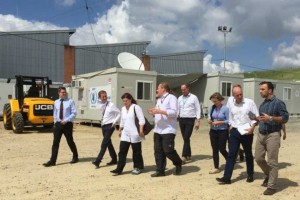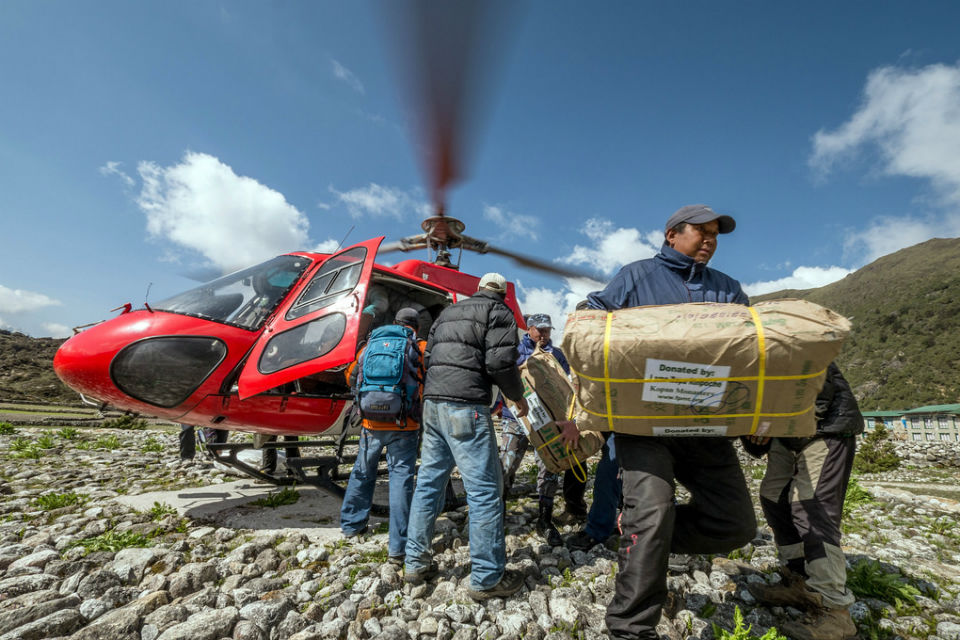
When I was asked to write this blog, I looked for a hook to hang it on and thought of the three ‘r’s: readiness, response, recovery. These neatly describe the phases of the prominent role the UK has played – and continues to play – in support of the Government and people of Nepal, after the recent devastating earthquake.
The last major earthquake in Nepal was in 1934. Ever since, the people of Nepal have been anticipating the next substantial seismic event.
That wait ended on 25 April 2015. Despite advances in human knowledge, we are not really in a better position to predict such events. This is what makes preparedness so critical.
Readiness
The Nepal earthquake demonstrated the importance of strong preparations for this type of natural disaster. This is a real challenge – how to gauge investments for an event that may not happen in your lifetime, or even your children’s?
But the supplies pre-positioned by the UK, including shelter kits and other items, meant that people were receiving emergency supplies within 24 hours, when otherwise we estimate they may have had to wait three weeks.
This saved many lives.
Also, investment in a vast humanitarian staging area at the airport, opened just one month before the earthquake, allowed supplies to be processed much faster, and made a significant difference to the speed of response and the numbers of lives saved. The World Food Programme’s Emergency Coordinator, Richard Ragan, described this as the best piece of forward thinking he had seen in his long career. While Baroness Amos, the then UN Under-Secretary-General for Humanitarian Affairs, said it had reduced response times by seven weeks.

And the first-aid training to communities and the blood bank – which the UK had set up – contributed to emergency healthcare being provided to those who needed it almost immediately. This was something we learned from the recent Pakistan earthquake.
And let’s not forget the importance of our own people’s readiness. The DFID staff on the ground in Nepal worked in difficult conditions, staying focused despite the human impact of the crisis. Their training in crisis management, first aid and earthquake preparedness helped them to work flat out supporting and coordinating the humanitarian response with the rest of HMG, the Government and military of Nepal, and other donors.
Response
We can all be immensely proud of the UK’s response, which was vital in saving lives and livelihoods. The cross-Government way in which we worked provides a model for future events. The FCO stood up their Crisis Centre almost immediately; and MoD were quick to mobilise, playing a significant role in the response. And others, such as Public Health England, and the fire services of Cheshire and Scotland, were in involved in the search and rescue.
The DFID team brought an understanding of the geography and politics of Nepal, so that UK assistance was effectively deployed. Immediately after the disaster struck, they identified the risks faced by poor and vulnerable people, particularly women, and collaborated with partners – including the Nepali police and the Women and Children department – to set up safe spaces in the affected districts and reduce the opportunities for trafficking and violence against women.
HMG’s emergency response was co-ordinated, rapid and effective, but we were supported by an outstanding group of organisations, groups and individuals from outside government.

The results speak for themselves. In three months, as a direct result of UK assistance, 200,000 people have received support to shelter; 35,000 have access to improved water and sanitation; and 15,000 women and girls have benefited from protection and gender initiatives.
This is all the product of exceptionally hard work by many people. And let us not forget the role played by the Disasters Emergency Committee appeal, which has generated an astounding £83 million in donations from the British public, including £5 million matched funding from DFID.
Recovery
I was asked to represent the UK at the International Conference on Nepal’s Reconstruction in Kathmandu at the end of June. This looked ahead, seeking support from the international community to assist Nepal in “building back better”.
I reiterated the UK’s full support for the people of Nepal – continuing a partnership that will reach a remarkable 200 years in 2016 – and pledged our financial commitment to the country’s recovery.
The tragic events of 25 April and its aftermath have changed many people’s lives forever but, with the right spirit and the right co-operation, we can make a difference. In the months and years ahead, DFID’s programmes will support Nepalis in areas of critical need: health, skills and employment; strengthening institutions to manage recovery; security and justice; and disaster-resilience.
1934, 2015...?
DFID is undertaking research work with various academic institutions, including the universities of Cambridge and Durham, as well as the Government Office of Science, to understand the science of earthquakes better. Unfortunately, we cannot predict whether the next event of this magnitude will be in 2016 or 2096, but we will continue to contribute to readiness, response and recovery. As I write, the team in Kathmandu is learning from its experience, restocking and helping Nepal prepare for future events.

3 comments
Comment by Charlotte Smith posted on
Let us not forget the work of the many volunteer organisations who are leading the way in providing aid and assistance to the various affected areas throughout the world, whether it be post earthquake Nepal or indeed the thousands of refugees arriving in Germany. I have in mind the Red Cross, UNESCO and so on. The German Red Cross for example have been extremely busy helping out in Munich where thousands of refugees have aided them with the provision of food, clothing, washing items etc. The British Red Cross has been doing the same, albiet on a smaller scale. I for one am greatful for the 3 days community/volunteering leave we have been given as that will allow me to offer my services to the British Red Cross for which i volunteer and have done for the past year and a half.
Comment by Gill Birch posted on
I have been fortunate to have visited Napal several times on holliday and was upset when the news broke of the earthquake. It is a fascinating country with friendly helpful people who manage with very little. Your blog was really intersting and I am pleased that the Civil Service were involved in helping and providing relief to the Nepalise people. A good example of how planning really can help. Makes me proud to be a Civil Servant.
Comment by Kevin Quinlan posted on
Thanks Beverley for this vivid blog reminding us of: the good work of colleagues before and after a crisis leaves the headlines; how good development can mitigate disaster; and how we should not waste a crisis in building back better. Relief and development are ever more inter-twinned in many of the places we work.